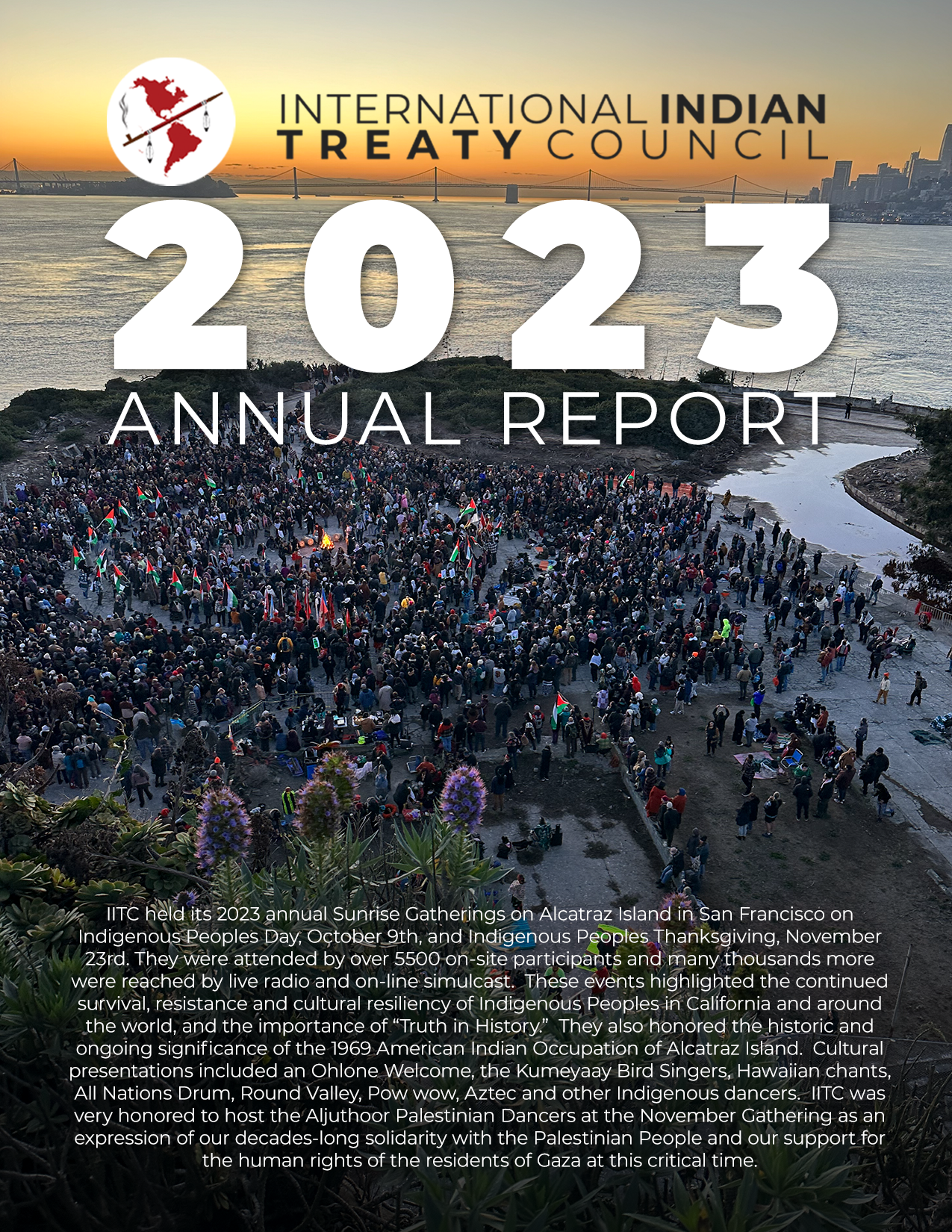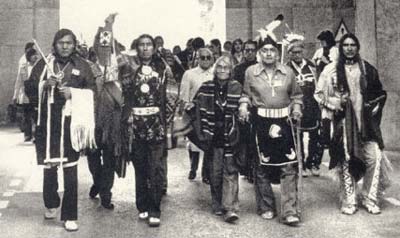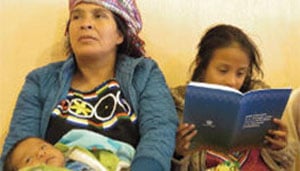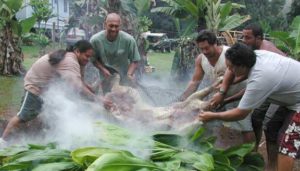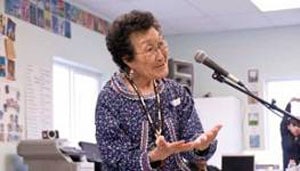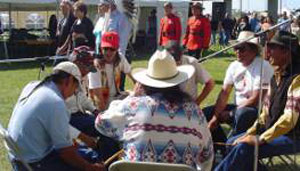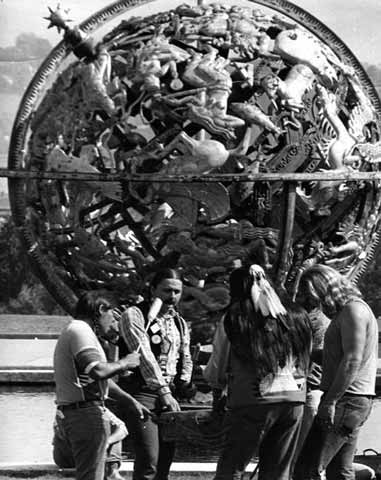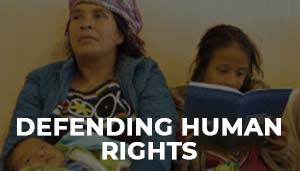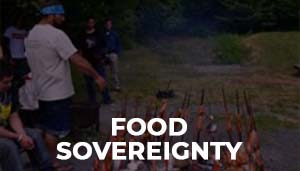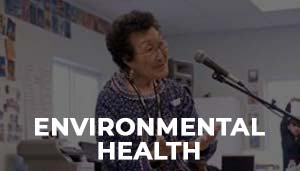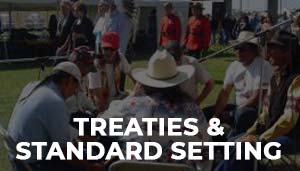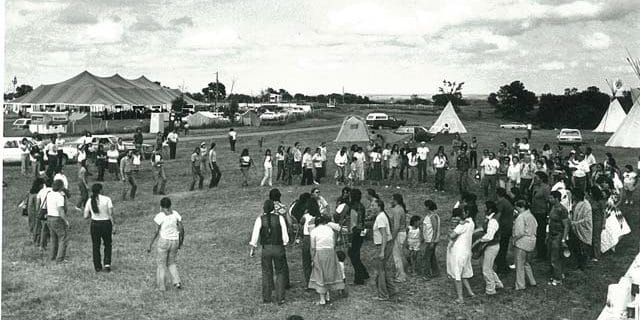Speaking notes for Introductory Remarks by Session Co-chair Andrea Carmen, member of the LCIPP FWG
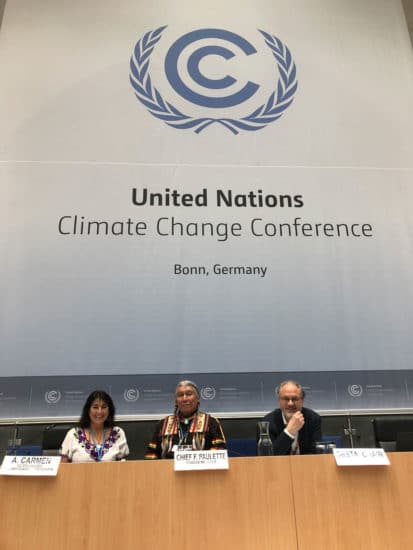
Thematic Workshop Session Co-Chairs Paul Watkinson, Chair of SBSTA and Andrea Carmen, member of the FWG, and elder Francois Paulette who did the opening and closing prayers.
- Thank you to our elder Francois Paulette for your guidance and help in beginning this session in a good way by asking for guidance of the Creator so that our thoughts and words will be positive and in the spirit of common purpose.
- Thanks also the opening remarks of the SBSTA Chair Mr. Paul Watkinson, to provide additional guidance and orientation for our discussions.
- At this session, called for in the decision made at COP 24, we warmly welcome the input of representatives of Indigenous Peoples and other organizations, State Parties as well as UN agencies and bodies who we hope will shed some light on a way, or ways, forward, based on two areas of discussion, 1) The concept of local communities, their self-representation and self-mobilization in the international climate change process and; 2) how to enhance the participation of LCs, in addition to Indigenous Peoples, in the LCIPP
- The Facilitative Working Group (FWG) was established last December in Katowice by COP 24, with the objective of further operationalizing the Local Communities and Indigenous Peoples Platform.
- It facilitates the implementation of the Platform’s three functions: knowledge, capacity for engagement, and climate change policies and actions.
- As you many know, the FWG is comprised of 14 representatives, half of which are representatives of Parties, and half of which represent Indigenous Peoples selected by Indigenous Peoples from the 7 Indigenous regions.
- I am happy to report, on behalf of the FWG, that the first meeting of the body, held this past weekend (14-16 June), was very successful, through equal partnership between Parties and Indigenous Peoples.
- Pasang Dolma Sherpa and Majid Shafiepour were elected as the FWG Co-Chairs. The vice co-chairs are Rodion Sulyandziga and Elvira Gutierrez Barron. The leadership is balanced as well between Parties and Indigenous Peoples.
- Among other outcomes, the grou
p drafted a draft two-year workplan, which it will finish polishing this week, and which will be for consideration at SBSSTA 51. - I am Co-chairing this session as a member of the FWG at the request of our co-chairs. To provide some additional considerations for the discussion, I will begin by sharing opening reflections based on some points of view of the Indigenous Peoples involved in this process, formally known as the International Indigenous Peoples Forum on Climate Change (IIPFCC).
- These perspectives are grounded in the many years that Indigenous Peoples have worked in the UN System as an organized constituency beginning in 1977 with the first Indigenous Peoples UN conference in Geneva, extending through 30 years of work on the UN Declaration on the Rights of Indigenous Peoples and at the same time working in other parts of the UN System. This includes the formation of the Indigenous Peoples Major Group in 1992 at the Rio Earth Summit and over 20 years of engagement in the During most of our experience at the UNFCCC we were on the outside looking in, barely allowed to observe the negotiations that directly impacted our lives and ways of life. Our calls for greater recognized formal participation took the form of meetings with states, joint statements in COP Sessions as well as marches and demonstrations over many years, even at COP 21 in Paris where the establishment of LCIPP was agreed.
- A key element in this discussion and the decision to form the FWG in Katowice was the firm recognition, based on the UN Declaration on the Rights of Indigenous Peoples, that Local Communities and Indigenous Peoples are distinct from each other in both rights and identity, although of course as Peoples we have our own Indigenous local communities. The discussion today regarding the concept of Local Communities must be considered in this light. We are discussing this issue in regard to local communities that are distinct from Indigenous Peoples as the decision at COP 24 recognized.
- As a long-organized global constituency, with agreed-upon protocols for our representation in this process, Indigenous Peoples are aware that there is not currently a clear organized consistency of self-identified “local communities” with ties to Traditional lifeways and knowledge that has yet emerged to take its place in this process. In that light the Indigenous Peoples caucus has maintained that we will not attempt to define or provide criteria for what constitutes “local communities” just as we would not accept others doing that for us. The ways that local communities will emerge to request participation in this process, based on their “self-representation and self-mobilization” will be up to them when the time comes.
- Finally, we note that the process and mechanisms for the engagement of Indigenous Peoples in the LCIPP and the UNFCCC have just begun to take shape as well within the historic advance and new opportunity presented by the FWG and what will become the workplan and activities of the LCIPP. In this light, we also see the need to continue discussing ways to build the participation of Indigenous Peoples in this process, including and especially of our traditional knowledge holders, we look forward to doing so in future dialogues.
With those opening remarks, by agreement with my co-chair I will proceed to chair session 1 by calling the first speaker to make her presentation, Ms. Rita Mishaan, Co-chair of the Paris Committee on Capacity Building. First, we have some opening remarks by my Co-chair representing the SBSTA and some background information presented by the Secretariat. Thank you, Choque Utesia.
Compartir esta publicación
Thematic Workshop on Enhancing the Participation of Local Communities, in addition to Indigenous Peoples, in the LCIPP
Speaking notes for Introductory Remarks by Session Co-chair Andrea Carmen, member of the LCIPP FWG

Thematic Workshop Session Co-Chairs Paul Watkinson, Chair of SBSTA and Andrea Carmen, member of the FWG, and elder Francois Paulette who did the opening and closing prayers.
- Thank you to our elder Francois Paulette for your guidance and help in beginning this session in a good way by asking for guidance of the Creator so that our thoughts and words will be positive and in the spirit of common purpose.
- Thanks also the opening remarks of the SBSTA Chair Mr. Paul Watkinson, to provide additional guidance and orientation for our discussions.
- At this session, called for in the decision made at COP 24, we warmly welcome the input of representatives of Indigenous Peoples and other organizations, State Parties as well as UN agencies and bodies who we hope will shed some light on a way, or ways, forward, based on two areas of discussion, 1) The concept of local communities, their self-representation and self-mobilization in the international climate change process and; 2) how to enhance the participation of LCs, in addition to Indigenous Peoples, in the LCIPP
- The Facilitative Working Group (FWG) was established last December in Katowice by COP 24, with the objective of further operationalizing the Local Communities and Indigenous Peoples Platform.
- It facilitates the implementation of the Platform’s three functions: knowledge, capacity for engagement, and climate change policies and actions.
- As you many know, the FWG is comprised of 14 representatives, half of which are representatives of Parties, and half of which represent Indigenous Peoples selected by Indigenous Peoples from the 7 Indigenous regions.
- I am happy to report, on behalf of the FWG, that the first meeting of the body, held this past weekend (14-16 June), was very successful, through equal partnership between Parties and Indigenous Peoples.
- Pasang Dolma Sherpa and Majid Shafiepour were elected as the FWG Co-Chairs. The vice co-chairs are Rodion Sulyandziga and Elvira Gutierrez Barron. The leadership is balanced as well between Parties and Indigenous Peoples.
- Among other outcomes, the grou
p drafted a draft two-year workplan, which it will finish polishing this week, and which will be for consideration at SBSSTA 51. - I am Co-chairing this session as a member of the FWG at the request of our co-chairs. To provide some additional considerations for the discussion, I will begin by sharing opening reflections based on some points of view of the Indigenous Peoples involved in this process, formally known as the International Indigenous Peoples Forum on Climate Change (IIPFCC).
- These perspectives are grounded in the many years that Indigenous Peoples have worked in the UN System as an organized constituency beginning in 1977 with the first Indigenous Peoples UN conference in Geneva, extending through 30 years of work on the UN Declaration on the Rights of Indigenous Peoples and at the same time working in other parts of the UN System. This includes the formation of the Indigenous Peoples Major Group in 1992 at the Rio Earth Summit and over 20 years of engagement in the During most of our experience at the UNFCCC we were on the outside looking in, barely allowed to observe the negotiations that directly impacted our lives and ways of life. Our calls for greater recognized formal participation took the form of meetings with states, joint statements in COP Sessions as well as marches and demonstrations over many years, even at COP 21 in Paris where the establishment of LCIPP was agreed.
- A key element in this discussion and the decision to form the FWG in Katowice was the firm recognition, based on the UN Declaration on the Rights of Indigenous Peoples, that Local Communities and Indigenous Peoples are distinct from each other in both rights and identity, although of course as Peoples we have our own Indigenous local communities. The discussion today regarding the concept of Local Communities must be considered in this light. We are discussing this issue in regard to local communities that are distinct from Indigenous Peoples as the decision at COP 24 recognized.
- As a long-organized global constituency, with agreed-upon protocols for our representation in this process, Indigenous Peoples are aware that there is not currently a clear organized consistency of self-identified “local communities” with ties to Traditional lifeways and knowledge that has yet emerged to take its place in this process. In that light the Indigenous Peoples caucus has maintained that we will not attempt to define or provide criteria for what constitutes “local communities” just as we would not accept others doing that for us. The ways that local communities will emerge to request participation in this process, based on their “self-representation and self-mobilization” will be up to them when the time comes.
- Finally, we note that the process and mechanisms for the engagement of Indigenous Peoples in the LCIPP and the UNFCCC have just begun to take shape as well within the historic advance and new opportunity presented by the FWG and what will become the workplan and activities of the LCIPP. In this light, we also see the need to continue discussing ways to build the participation of Indigenous Peoples in this process, including and especially of our traditional knowledge holders, we look forward to doing so in future dialogues.
With those opening remarks, by agreement with my co-chair I will proceed to chair session 1 by calling the first speaker to make her presentation, Ms. Rita Mishaan, Co-chair of the Paris Committee on Capacity Building. First, we have some opening remarks by my Co-chair representing the SBSTA and some background information presented by the Secretariat. Thank you, Choque Utesia.
